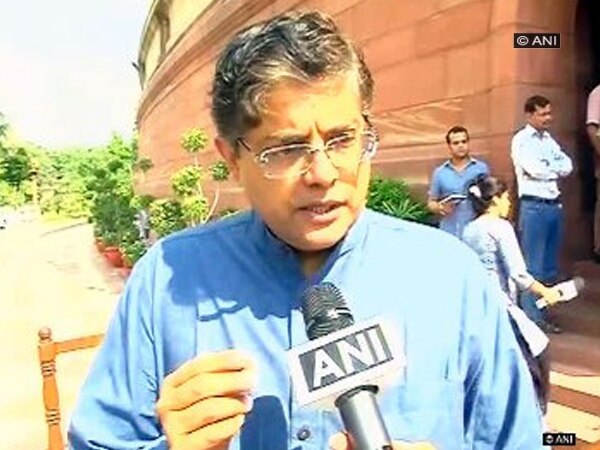India's role to help idea of stable security, economic construct in Indian Ocean region: Jay Panda

Colombo [Sri Lanka], Sept 2 (ANI): India's role is to help the idea of biennial and stable security and economic construction in Indian Ocean region, stated Biju Janata Dal (BJD) MP Baijayant 'Jay' Panda on Friday at the Indian Ocean Conference in Colombo, Sri Lanka.
"One of the lessons that we have to learn is that after Work War II, a global system was emerged where the most powerful country in the world, which is the U.S, played a very biennial and a beneficial role in creating this harmonious economic and stable environment that also the big countries in Asia also need to do," Panda told ANI, on the sidelines of the conference.
Jay Panda further stated that the Indian Ocean region has the potential for economic growth and development, which is going to be the major engine of the "world economy in the forcible future."
"This needs to be tapped properly and historically the kind of links that used to be there that India and other countries ranging all the way across the Indian Ocean had got disrupted by various forces," he said minutes before addressing the mass on the second day of the three-day conference.
Panda added that this is going to have a very positive impact, not just for the dozens of countries in the Indian Ocean region, but also for the whole world.
"Big countries like China also depend upon Indian Ocean for sea transport for trade to get about 80 percent of their fuel and energy requirement; hence it is in everybody's interest to ensure that there is stability rather than disputes," Panda said on the China Sea dispute.
Attending the Indian Ocean Conference Jawaharlal Nehru University (JNU) professor Makarand R. Paranjape talked about China and said that when it comes to China's move in the South China Sea, then one can see that it "first lays claims to territories of smaller nations."
"When it comes to China's move in the South China Sea if you have to learn anything from our impasse or standoff at Doklam recently we see that China first lays claims to territories of smaller nations citing sometimes doubtful if not dubious historical reasons and then tries to occupy them and it seems as if in the South China sea as well a certain port in Sri Lanka, China wants to exercise its influence," JNU Professor Paranjape told ANI.
He further said that Indian Ocean conference is a "strong counter" to China's tactics of political and economical muscle flexing.
"If China wants to respect the sovereignty of other countries including India then it should not be building a road through a disputed territory. It's like giving offense and questioning the sovereignty of India," said Paranjape.
Talking about the "one road, one belt," Paranjape said that the one road one belt initiative is to caste into doubt, as Balochistan has become a volatile region itself.
Bharatiya Janata Party's (BJP) National General Secretary Ram Madhav, earlier in the day, stated, at the Indian Ocean Conference, "Where China claimed to be not against freedom of navigation, other nations raised their concerns on the issue of freedom of navigation in China Sea."
While Foreign Secretary Dr. Subrahmanyam Jaishankar addressing the second Indian Ocean Conference here, on Friday, said that Indian Ocean must be approached with empathy, not as a business.
On the first day of the event (on August 31), External Affair Minister (EAM) Sushma Swaraj said that safety and security of the Indian Ocean is paramount for New Delhi.
"Our vision for the Indian Ocean region is to preserve its organic unity, while advancing cooperation. We envisage Indian Ocean as an engine for growth and prosperity in our region and beyond. It is of utmost importance that these waters remain safe and secure. This vision was initiated by Prime Minister Narendra Modi in March 2015 when we put forward the concept of SAGAR (Security and Growth for all in the Region). This is a clear high level articulation of India's vision for the Indian Ocean," she said at the conference in Colombo.
India Foundation, a Delhi-based think tank in collaboration with Rajaratnam School of International Studies (RSIS), Singapore, and National Institute of Fundamental Studies (NIFS), Colombo has organized the Indian Ocean Conference 2017. (ANI)
This story has not been edited. It has been published as provided by ANI
Related Video
Delhi News: Why Bulldozer Action Was Conducted at Night? DCP Nitin Valson Explains Key Reasons




























